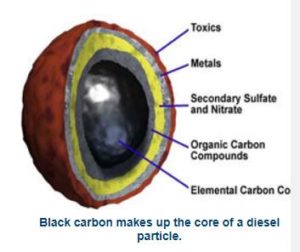Our neighborhood association (Brooklyn Action Corps) has joined a citywide coalition of neighborhoods to address Portland’s longstanding and worsening diesel pollution problem.
On September 26, 2018, we hosted a citywide Townhall Forum on diesel pollution, inviting subject matter experts to help us understand the scope of the crisis, and a panel of elected officials and candidates to ask what can be done.
The National Air Toxics Assessment shows that Portland’s airshed is bursting with a toxic stew consisting of dozens of heavy metals and toxic chemicals, including 49 that are carcinogenic. The assessment was based on 2011 data that took several years for the EPA to analyze and compile.
What is a diesel particulate?
Also know as “black soot,” a diesel particulate is a product of diesel combustion. When diesel fuel is burned, the exhaust contains tiny particles of carbon surrounded by layers of toxic chemicals and gases. Here is a diagram of one diesel particulate. It is 2.5 microns in diameter or smaller. A micron = 1 millionth of a meter. A human blood cell is 6 microns in diameter. A human hair = the diameter of about 28 particulates. Several thousand particulates would fit on a period. Image source: Clean Air Task Force.
These tiny particulates evade our body’s defenses, pass through our lungs into our bloodstream, and lodge in our organs, including the brain.
Brooklyn and adjacent neighborhoods are severely affected because of the Brooklyn Rail Yard. Locomotives idle 24/7, and the majority of intermodal freight trucks serving the yards lack any modern emissions controls.
Join our mailing list on the form below, to receive news and updates on this important issue.
Read our fact sheet: “Portland Neighbors for Diesel Action.”
Here are the information sources recommended by the fact sheet.
“Brooklyn Rail Yard Report” (2017) by Creston-Kenilowrth Association.
“Airborne Particulate Matter and Public Health” (2015) by Oregon Physicians for Social Responsibility.
“Portland Area Unfiltered Commercial Diesel Trucks over 26,000 lbs.” (2018) by Portland Clean Air.
“Diesel Truck Mitigation” (2018) by Portland Clean Air.
See these additional sources:
On Portland’s diesel pollution
Video of our Sep 26, 2018 Diesel Townhall Forum
“Portland air among worst in nation”
“EPA grant will fund deep dive into Portland diesel exhaust”
“Oregon DEQ Air Toxics Program”
“Portland Scientists to Study Local Threat from Diesel Exhaust” (2018) by Oregon Public Broadcasting.
Portland Clean Air (2015). “Industrial Diesel in Portland” with Diesel Particulate Map for Portland, by Portland Clean Air.
Abstract of 2008 Linda George paper on pollution modelling
KBOO “Old Mole” episode about diesel pollution (Sep 24, 2018; starts at approximately -53’36“)
Reed Magazine (2014). “Senior Thesis Tracks Pollution at Portland Rail Yard”
On health impacts of air pollution, including diesel
Washington Post (Sep 5, 2018): Diesel exposure a major risk factor for dementia
Guardian (August 26, 2018). Air Pollution Causes Huge Reduction in Intelligence, Study Reveals
Oregon DEQ (2018). “Health Effects of Diesel Exhaust”
Oregonian (7-23-2018). “What’s in Portland’s Smoky Air? We talked to an air scientist.”
Diesel pollution in European cars
Can we reduce our exposure to diesel exhaust?
Our Pollution Dilemma in a Broader Context
Independent Science News, “Designed to Fail: Why our Regulatory Agencies Don’t Work”
Cascadia Times (8-28-2018), “DEQ in the Dark”
Organizations
Doctors Against Diesel (A U.K. sroup)
Oregon DEQ Air Quality
Oregon Physicians for Social Responsibility
Oregon Environmental Council
U. S. Environmental Protection Administration
Galleries
DEQ Monitoring Station, 5824 Lafayette Street, Portland
Brooklyn Rail Yard at the Holgate Boulevard Bridge
Mailing list
Subscribe to our Diesel Pollution or General Information mailing lists below
Contact us with any questions by using the form below.
[contact-form to=”dieselpollution@brooklyn-neighborhood.org” subject=”Diesel Particulate Issue”][contact-field label=”Name” type=”name” required=”1″][contact-field label=”Email” type=”email” required=”1″][contact-field label=”Message” type=”textarea” required=”1″][/contact-form]





